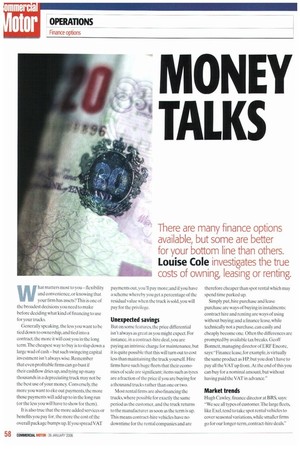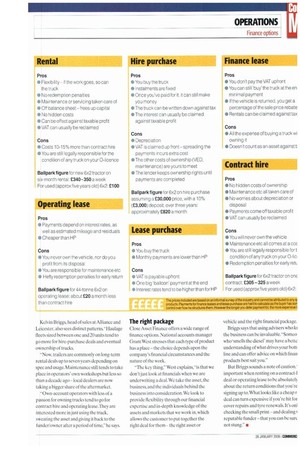MONEY TALKS
Page 58

Page 59

If you've noticed an error in this article please click here to report it so we can fix it.
There are many finance options available, but some are better for your bottom line than others.
Louise Cole investigates the true
ft& costs of owning, leasing or renting.
What matters most to you — flexibility and convenience, or knowing that your firm has assets?This is one of the broadest decisions you need to make before deciding what kind of financing to use for your trucks.
Generally speaking, the less you want to be tied down to ownership. and tied into a contract, the more it will cost you in the long term.'The cheapest way to buy is to slap down a large wad of cash — but such swingeing capital investment isn't always wise. Remember that even profitable firms can go bust if their cashflow dries up, and tying up many thousands in a depreciating truck may not be the best use of your money. Conversely, the more you want to eke out payments, the more those payments will add up to in the long run (or the less you will have to show for them).
It is also true that the more added services or benefits you pay for, the more the cost of the overall package bumps up. If you spread VAT payments out, you'll pay more: and if you have a scheme whereby you get a percentage of the residual value when the truck is sold,you will pay for the privilege.
Unexpected savings
But on some features, the price differential isn't always as great as you might expect. For instance, in a contract-hire deal, you are paying an intrinsic charge for maintenance. but it is quite possible that this will turn out to cost less than maintaining the truck yourself. Hire firms have such huge fleets that their economies of scale are significant: items such as tyres are a fraction of the price if you are buying for a thousand trucks rather than one or two.
Most rental firms are also financing the trucks, where possible for exactly the same period as the customer, and the truck returns to the manufacturer as soon as the term is up. This means contract-hire vehicles have no downtime for the rental companies and are therefore cheaper than spot rental which may spend time parked up.
Simply put, hire purchase and lease purchase are ways of buying in instalments: contract hire and renting are ways of using without buying: and a finance lease, while technically not a purchase, can easily and cheaply become one. Often the differences are prompted by available tax breaks. Geoff Bonnett. managing director of ERF Encore, says:"Fmance lease, for example. is virtually the same product as HP, hut you don't have to pay all the VAT up front. At the end of this you can buy for a nominal amount, but without having paid the VAT in advance."
Market trends
Hugh Cawley finance director at BRS, says: -We see all types of customer.The large fleets, like Exel. tend to take spot rental vehicles to cover seasonal variations, while smaller firms go for our longer-term,contract-hire Kelvin Briggs, head of sales at Alliance and Leicester, also sees distinct patterris."Haulage fleets sized between one and 20 units tend to go more for hire-purchase deals and eventual ownership of trucks.
'Now, trailers are commonly on long-term rental deals up to seven years depending on spec and usage. Maintenance still tends to take place in operators' own workshops but less so than a decade ago-local dealers are now taking a bigger share of the aftermarket.
"Own-account operators with less of a passion for owning trucks tend to go for contract hire and operating lease. They are interested more in just using the truck, sweating the asset and giving it back to the funderlowner after a period of time.' he says.
The right package
Close Asset Finance offers a wide range of finance options. National accounts manager Grant West stresses that each type of product has a place the choice depends upon the company's financial circumstances and the nature of the work.
"The key thing," West explains,-is that we don't just look at financials when we are underwriting a deal.We take the asset, the business,and the individuals behind the business into consideration.We look to provide flexibility through our financial expertise and in-depth knowledge of the assets and markets that we work in, which allows the customer to put together the right deal for them the right asset or vehicle and the right financial package.
Briggs says that using advisers who ki the business can be invaluable."Somea who 'smells the diesel' may have a belie understanding of what drives your both line and can offer advice on which finan products best suit you."
But Briggs sounds a note of caution.' important when renting on a con tract-I deal or operating lease to he absolute]) about the return conditions that you're signing up to. What looks like a cheap r deal can turn expensive if you're hit for cover repairs and tyre renewals. It's onl checking the small print-and dealing) reputable funder -that you can be sun: not stung.•
































































































































































































